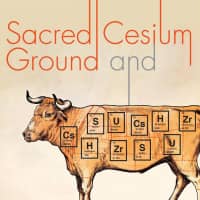An anger directed toward Tokyo underlies Yusuke Kimura's two novellas, "Sacred Cesium Ground" and "Isa's Deluge." Born from a keen sense of abandonment felt by the Tohoku region in the aftermath of the 3/11 disaster, this anger plays out across stories exploring the post-disaster relationships between humans and animals.
Sacred Cesium Ground and Isa's Deluge, by Yusuke Kimura, Translated by Doug Slaymaker.
176 pages
COLUMBIA UNIVERSITY PRESS, Fiction.
The main character in "Sacred Cesium Ground" is a woman from Tokyo who travels to Fukushima Prefecture to volunteer at the Fortress of Hope, a farm where cattle irradiated by the meltdown of the Fukushima No. 1 power plant are tended to despite a government order to kill them.
Based on the story of a real post-Fukushima ranch, the novella carries with it a weight of research born from the author's own volunteering, though proves somewhat slow reading and ultimately unsatisfying, never quite reaching the moment of reinvention that the lead character hints at throughout.
"Isa's Deluge" is the more readable of the two, with a flow and pacing that draws in the reader. Shortlisted for the Mishima Yukio Prize after it was first published in 2012, it follows a family of fishermen who relate the story of their uncle Isa and his "deluge" of pain and depression, an allegory of the 3/11 tsunami.
Both novellas highlight peripheral voices in the post-3/11 period and ultimately return time and again to that tension between a "sacrificial" Tohoku and an all-powerful capital. These perspectives are those not frequently heard and challenge the widespread narrative of an ever-dominant Tokyo.

















With your current subscription plan you can comment on stories. However, before writing your first comment, please create a display name in the Profile section of your subscriber account page.